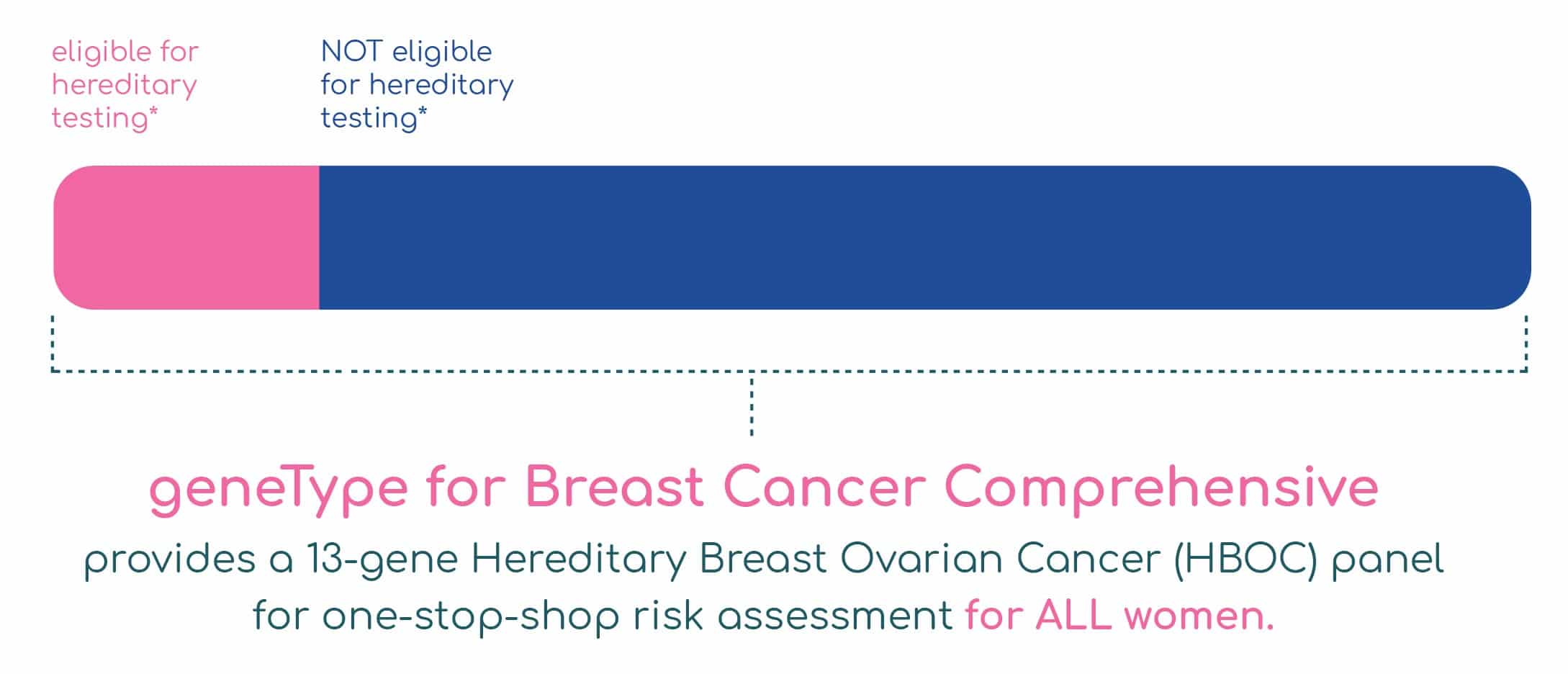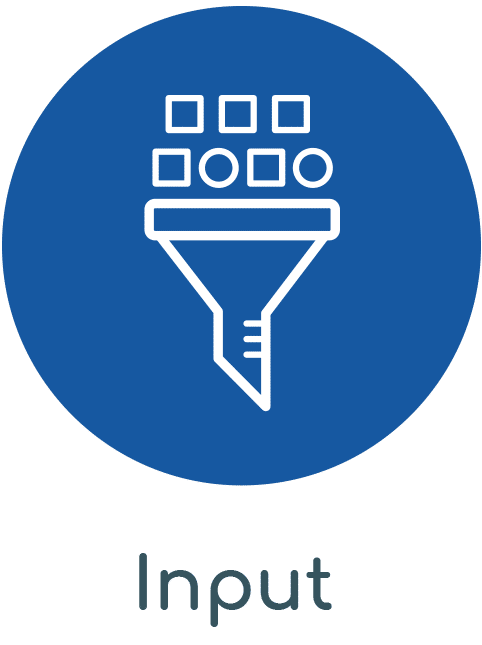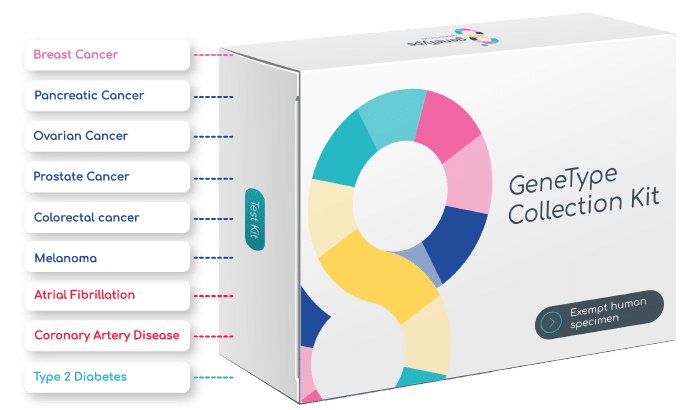A comprehensive breast cancer risk assessment, even if your patient doesn’t meet HBOC gene panel testing criteria.
geneType Comprehensive now includes a 13 gene Hereditary Breast and Ovarian Cancer (HBOC) panel in addition to the standard polygenic-integrated breast and ovarian cancer risk assessments.
geneType comprehensive assesses your patient for hereditary, familial & sporadic risk
of breast and ovarian cancer
The Problem
While screening for pathogenic variants (like BRCA1/2) can be an important first step
- Most women don’t qualify for BRCA1/2 testing based on their family history status, and
- Most women who do qualify for testing will come back with negative results
All women above 35 should be risk-assessed for their liklihood of developing breast cancer

The majority of women diagnosed with breast cancer are diagnosed with sporadic disease.
The Solution
geneType offers affordable self-pay testing to cover HBOC gene panel testing to all women, regardless of whether they qualify (by ACMG/NCCN guidelines)
And, even when your patient comes back with negative HBOC results, she will still receive a personalized absolute risk score based on a combination of her clinical risk factors integrated with her polygenic risk.
Predict your patient’s chance of developing breast cancer based on all of her risk factors.
*at-risk women are defined by guideline-driven, actionable thresholds; 20% lifetime risk and 1.67% or 3% 5-year risk scores1,6,8,9
Once identified, your at-risk* patient has more risk-reduction and supplemental screening recommendations available to her.

Traditional ACMG/NCCN guidelines for germline HBOC testing require a healthy, unaffected patient to have a suspicious family history of breast cancer.
But, when looking at women already diagnosed with breast cancer, half of those identified with pathogenic variants wouldn’t have met hereditary testing criteria. Beitsch et al JCO 2019
With geneType, you can catch these women before they are ever diagnosed.
Sporadic disease is the most commonly diagnosed form of breast cancer, meaning these women don’t have significant family history nor are they pathogenic variant carriers at diagnosis!

The value of a Comprehensive, integrated risk assessment
One in 200^ women are positive for a hereditary breast cancer associated pathogenic variant.
One in 5 women will have a combination of risk factors that put them at an actionable, increased risk.*
^based on the CARRIERS consortium data, for a 12 gene HBOC panel, the prevalence could be as high as 3 in 200 general population women
*using established clinical thresholds 5-year risk threshold of 1.67% or 3%; lifetime risk threshold of 20%
geneType improves upon traditional risk assessment.
The future of risk stratification is here.
Click below to learn more about the common genetic markers in geneType’s polygenic risk scores.

1. DNA (non-invasive buccal collection)
2. Clinical risk factors (family history, breast density, menopausal status and BMI)

1. Pathogenic variant status^
2. Personalized risk scores for breast* and ovarian:
- remaining lifetime risk
- 5-year risk
^ sequencing of: ATM, BARD1, BRCA1, BRCA2, BRIP1, CHEK2, NF1, PALB2, PTEN, RAD51C, RAD51D, STK11¸ TP53
* risk scores have actionable thresholds defined within NCCN, ASCO, USPSTF recommendations
Proactively identify and manage all women at increased risk of developing breast cancer
Know her risk.
Manage her risk.
Risk reduction* options include:
- Mammography (digital, tomosynthesis)
- MRI
- Ultrasound
- Breast cancer prevention specialist referral
- Medication aromatase inhibitors; selective estrogen receptor modulators
- Diet and exercise modifications
- Smoking cessation
- Alcohol consumption modification
* based on NCCN, ASCO, USPSTF recommendations

By knowing her personalized risk of breast cancer you can tailor your risk-reduction recommendations.

The geneType patient
GeneType for Breast Cancer is appropriate for:
- Women
- Aged 30 years or older
GeneType is not appropriate for women with a personal history of breast cancer, or those who are positive for a pathogenic variant associated with hereditary breast cancer.
Testing is simple

Step 1
Register as a provider; our team will provide clinical education and other resources as needed.
geneType will send kits to your clinic to have on hand.

Step 2
Discuss geneType with your patient.
Would geneType help them qualify for additional risk reduction strategies?

Step 3
Complete the Test Requisition form, collect a sample from the patient in the buccal swabs provided and return both to geneType.
You will have the option to use a paper requisition, or a secure, compliant portal to complete the ordering process.

Step 4
Leave the rest to us.
geneType will notify you when your patient’s results are ready.
You will have the option to request a consult with a genetic counsellor, whether to review your patient’s results and/or to follow-up with your patient, as needed.
Straightforward interpretation:
-
Your patient’s absolute risk scores
-
5-year risk
- remaining lifetime-risk
-
- Interpretation of the risk scores in the context of current guidelines
- Types of screening and risk reduction interventions relevant to her risk category
Simple Actionable Insights

Simple communication to your patient:
-
Risk scores presented in the context of other women her age
-
Types of screening and risk reduction interventions relevant to her risk category
- Information about modifiable breast cancer risk factors
Do you have questions?
We have answers.
If we haven’t answered your question, contact us directly.
How does this fit in with the guidelines?
The guidelines recommend you assess risk.
Women 35 and older are eligible for breast cancer risk reducing options based on their 5-year risk scores, as recommended by the United States Preventative Services Taskforce (USPSTF), National Comprehensive Cancer Network (NCCN) and American Society of Clinical Oncology (ASCO). Furthermore, supplemental surveillance such as MRI is available for patients with lifetime risk scores greater than 20%, as recommended by NCCN, American College of Radiology (ACR), The American Society of Breast Surgeons (ASBrS).
To see if your patient is eligible for any of the available risk reduction or surveillance options, it is important to assess her risk.
While gene panel testing is not recommended for patients without suspicious family history (see ACMG, NCCN guidelines), there is clinical evidence suggesting that family history guidelines miss a fraction of adults that are pathogenic variant carriers. geneType Comprehensive allows you to assess your general population patient for her risk of carrying a pathogenic hereditary cancer susceptibility variant AND her absolute 5-year and lifetime risk of developing breast cancer.
Who is the ideal patient for geneType Comprehensive HBOC?
If a woman has a limited family history, but her insurance is denying her coverage for gene panel testing through a traditional lab, then our 13 gene panel is a good alternative for out of pocket spending because it comes with the additional breast and ovarian risk assessments as negative reflex to the 13 gene panel (which the other “traditional” labs so not currently offer).
Another candidate is a woman who is willing to spend a bit more out of pocket to get a comprehensive risk assessment to rule out the very rare possibility of a high penetrance pathogenic variant before recieving geneType’s standard breast and ovarian risk assessments. Pathogenic variants are typically seen with a suspicious family history, but family history is not always possible to trace due to adoption, limited family contact, limited family (1 child through generations) and thus there are a small percentage (<1%) of cases where pathogenic variants are found in women without family history of the disease.
If my patient already gets her regular mammogram, is there benefit to know her breast cancer risk score?
Yes! A breast cancer risk score (lifetime and 5-year risk) can be used to tailor a screening and risk-reduction plan for your patient. If she is at increased risk, this may entail supplemental screening options. She also may be eligible for risk reducing medication.
Furthermore, with geneType Comprehensive, if your patient is a pathogenic variant carrier, there are additional screening and risk-reduction options that should be discussed.
I already order hereditary genetic germline gene panels for my patients' breast cancer risk, should I order geneType Comprehensive or the regular geneType?
If your patient already has had an HBOC gene panel, there is no need to order geneType Comprehensive. Please order the “regular” geneType for breast cancer risk assessment instead. The geneType test does NOT look for hereditary germline pathogenic variants. We are a risk assessment for your patients that either do not qualify for hereditary testing, or who have received negative germline hereditary cancer panel results. Hereditary genetic testing is the tip of the iceberg in breast cancer risk assessment. Although impactful, it only affects a small proportion of your patient population. The remainder of your patient population is still at risk of sporadic (non-hereditary) breast cancer; geneType can help identify a group of at-risk patients that may have otherwise “flown under your radar.”
If my patient does not have an elevated risk on the test, does that mean she can skip her mammogram screenings?
No!
GeneType for Breast Cancer results will indicate whether the patient is at increased or average risk.
If she is at average risk, it is still important to follow the recommended screening guidelines for women of her age.
Is this test reimbursed by insurance?
No. At this time geneType is a self-pay test. However, your patient may use FSA/HSA to pay for the test.
Are you ready to get started with geneType?
The first step is to trial geneType within your practice.

*Patient eligibility dependent on personal medical history, age and sex
Interested in ordering more than one disease? Order geneType Multi-Test.
See individual disease pages for more information about each test.
The Multi-Risk suite of tests is for adults 40-85 years of age. At maximum, a woman would be eligible for 8 diseases in the panel; a man would be eligible for 7. Starting at age 30, a patient may qualify for geneType's cancer risk assessments only.
Blog posts
GeneType Multi-Risk assessments tailored to your needs
It’s not always easy to know what questions to ask your Doctor. Here are some breast cancer risk questions…
Breast Cancer risk – Starting the conversation
It’s not always easy to know what questions to ask your Doctor. Here are some breast cancer risk questions…
Proactive steps for breast cancer risk reduction
Breast awareness is important whether you are 35 or 75. When you understand your risk, you can be a better advocate for yourself…
References
- American Cancer Society. URL: https://www.cancer.org/cancer/breast-cancer/understanding-a-breast-cancer-diagnosis/breast-cancer-survival-rates.html
- van der Groep P et al. Cell Oncol (Dordr) 2011;34:71 -88.
- Spaeth EL, et al. Validation of an Abridged Breast Cancer Risk Prediction Model for the General Population. Cancer Prev Res (Phila). 2023;16(5):281-291.
- Allman R, et al. SNPs and breast cancer risk prediction for African American and Hispanic women. Breast Cancer Res Treat. 2015 Dec;154(3):583-9.
- Allman R, et al. Breast Cancer Research and Treatment 2023 doi: 10.1007/s10549-022-06834-7.
- Medication Use to Reduce Risk of Breast Cancer, United States Preventative Services Task Force. JAMA. 2019; 322(9):857-867
- NCCN Clinical Practice Guidelines in Oncology (NCCN Guidelines); Breast Cancer Screening and Diagnosis. Version 1.2024- Accessed Dec 2023
- NCCN Clinical Practice Guidelines in Oncology (NCCN Guidelines); Breast Cancer Risk Reduction. Version 3.2023 – Accessed Dec 2023
- Use of Endocrine Therapy for Breast Cancer Risk Reduction. Journal of Clinical Oncology 37, no. 33 (November 20, 2019) 3152-3165.
- Monticciolo D et al. Breast Cancer Screening Recommendations Inclusive of All Women at Average Risk: Update from the ACR and Society of Breast Imaging. J Am Coll Radiol. 2021 Sep;18(9):1280-1288.
- Beitsch PD, et al. Underdiagnosis of Hereditary Breast Cancer: Are Genetic Testing Guidelines a Tool or an Obstacle?. J Clin Oncol. 2019;37(6):453-460.
- Hu C, et al. A Population-Based Study of Genes Previously Implicated in Breast Cancer N Engl J Med 2021; 384:440-451








